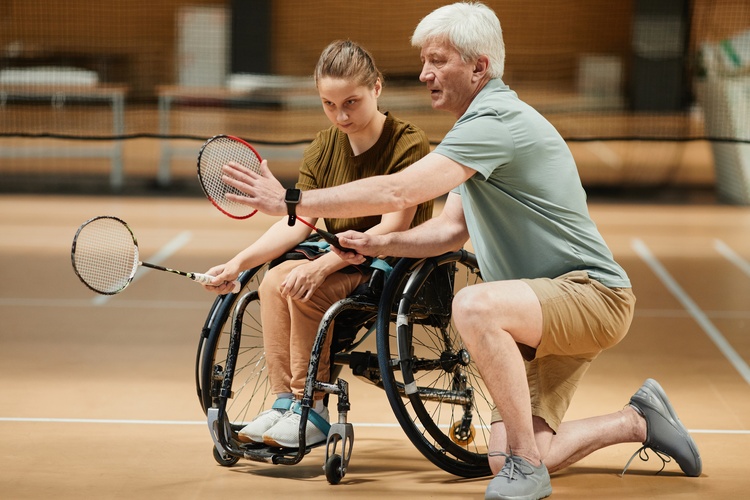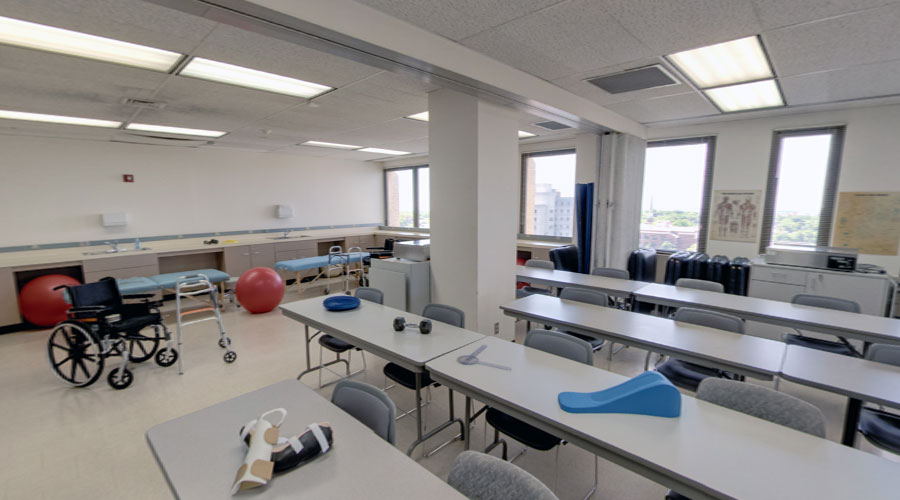Therapeutic Recreation Certificate
Therapeutic Recreation, also known as recreation therapy, is a unique profession that uses recreation and activity-based interventions to help improve people’s physical, emotional, cognitive, social, spiritual and leisure functioning to enjoy life more fully. Recreational therapists help others get better by leading them in activities they love to do.
The Therapeutic Recreation Specialist, also known as a Recreation Therapist (RT), assists clients to develop skills, knowledge and behaviors for daily living and community involvement. As an RT, you will actively work with a client (and the family) to combine leisure interests and community resources together with therapy. This helps the client get the best results which in turn can help in his/her real life situation.
Program Type
Undergraduate Certificate
Program Format
Online
What can you do with a Certificate in Therapeutic Recreation?
There is much you may do with a TR Certificate. This program is designed to help build a pathway toward obtaining the credential in the field of TR. The content of the 6 required TR specific courses provide students with theoretical and practical backgrounds in recreation and activity-based interventions.
The content of the courses also has much carry over into other professional areas for employment. The topic of disability is explored heavily; this knowledge may be helpful when working in agencies serving persons living with a disability. Concepts of group process and facilitation are topics that may be useful in any professional job requiring small and large group undertakings.
The courses in the Certificate Program will prepare you to work in a variety of settings, including hospitals, ambulatory health care services, nursing care facilities (skilled nursing facilities), residential care facilities, government institutions, community park and recreation agencies and disability agencies.

- You can become part of a growing field as the large baby-boom generation ages and needs RTs to help treat age-related injuries and illnesses.
- You can benefit from an interesting mix of students from across the nation and also a variety of backgrounds, including traditional UWM students seeking a bachelor’s degree, TR and other human service professionals and second career students new to the field.
- Recreation Therapist was cited as one of the “Top 10 Best Jobs to Save the World” by CNN Money and also as a “Best College Major for a Lucrative Career” by Kiplinger.
Related Programs
If you are interested in pursuing a career in Therapeutic Recreation, you may wish to examine the following UWM programs:
What can you do with a Certificate in Therapeutic Recreation?
There is much you may do with a TR Certificate. This program is designed to help build a pathway toward obtaining the credential in the field of TR. The content of the 6 required TR specific courses provide students with theoretical and practical backgrounds in recreation and activity-based interventions.
The content of the courses also has much carry over into other professional areas for employment. The topic of disability is explored heavily; this knowledge may be helpful when working in agencies serving persons living with a disability. Concepts of group process and facilitation are topics that may be useful in any professional job requiring small and large group undertakings.
The courses in the Certificate Program will prepare you to work in a variety of settings, including:
- Hospitals
- Ambulatory health care services
- Nursing care facilities (skilled nursing facilities)
- Residential care facilities
- Government institutions
- Community park and recreation agencies
- Disability agencies
Info on the TR Profession
- American Therapeutic Recreation Association (ATRA)
- US Department of Labor Occupational Outlook Handbook
- National Council for Therapeutic Recreation Certification (NCTRC)
Employment Outlook
Earnings
The median annual wage for recreational therapists in 2023 was $57,120 per year or approximately $27.46 per hour. The lowest 10 percent earned less than $30,880, and the highest 10 percent earned more than $77,970.
Expected Growth
Employment of recreational therapists is projected to grow 4 percent from 2022 to 2032, about as fast as the average for all occupations.
Demand for recreational therapists is expected to increase in some industries and some populations. Examples include employment at behavioral/mental health facilities serving individual with mental health diagnoses and/or substance use disorders. Another example is the aging population. Recreation Therapists may work with older adults in a variety of settings such as community agencies, senior centers, senior living communities, assisted living, memory care and other areas.
This certificate program is subject to federal gainful employment regulations.
For more information regarding the UWM Certificate in Therapeutic Recreation, please review the gainful employment disclosure information (PDF).
Students need to be enrolled in a UWM undergraduate degree program or hold a minimum of a bachelor’s degree to enter the Certificate Program. In addition, individuals who are certified with the National Council for Therapeutic Recreation Certification (NCTRC) may wish to complete one or more courses to comply with continuing education requirements.
The first step to declaring the Certificate in Therapeutic Recreation is to read the Gainful Employment Disclosure Information (PDF) and complete the form below. The second step is to submit an application for admission to UWM.
For further guidance, please contact the Therapeutic Recreation Certificate Coordinator or the College of Health Sciences Office of Student Affairs.
A total of six courses/18 credits comprise the TR Certificate curriculum. The courses are grouped into three categories: Introductory courses, Intervention courses and the Capstone course. Students need to complete one course/three credits from the Introductory course options, four courses/12 credits from the Intervention course options and one course/three credits from the Capstone option.
Courses that meet the NCTRC standards requirements are indicated with an asterisk. A cumulative grade point average of 2.5 must be maintained on all required coursework.
Completion of this certificate program allows you to meet one portion of the academic coursework required for the credential as a Certified Therapeutic Recreation Specialist (CTRS) with NCTRC. Additional requirements (degree, supportive courses and paid experience) are needed to fully qualify for the credential.
If you are interested in obtaining NCTRC certification, visit nctrc.org and review the Equivalency Path information.
Introductory Course (Select 1)
| COURSE | CREDITS |
|---|---|
| THERREC 103: Life Balance: An Understanding of Leisure | 3 |
| THERREC 202: Disability: Society and the Person | 3 |
| THERREC 203: TR Process* | 3 |
Intervention Courses (Select 4)
| COURSE | CREDITS |
|---|---|
| THERREC 300: Therapeutic Recreation Assessment and Documentation* | 3 |
| THERREC 303: Inclusive and Disability Programs in the Community | 3 |
| THERREC 308: Therapeutic Recreation in Physical Rehabilitation and Behavioral Health* | 3 |
| THERREC 309: Therapeutic Recreation in Pediatrics and Gerontology* | 3 |
| THERREC 310: Facilitation Techniques in Therapeutic Recreation* | 3 |
Capstone Course
| COURSE | CREDITS |
|---|---|
| THERREC 400: Issues and Trends in Therapeutic Recreation* | 3 |
*Required for students seeking the credential as a CTRS with NCTRC.
Please see the Schedule of Classes for the most up-to-date course offerings.
Supportive Courses
Supportive coursework is NOT part of the TR Certificate Program. Eighteen credits of supportive coursework is a requirement to become a CTRS. Nine of the credits are required in specific topic areas. Please see below. You may take UWM courses independent of the TR Certificate Program. If you are interested in becoming eligible to sit for the CTRS exam, there are many supportive on campus courses available to you including those listed below. Most of the courses are offered in the traditional face-to-face format though a growing number are offered online. Please see the Schedule of Classes for the most up-to-date listing and medium used.
Required Supportive Courses for NCTRC
| Course | Credits |
|---|---|
| BIOSCI 201, 202 or 203: Anatomy & Physiology | 4 |
| HCA 203: Human Life Cycle or NURS 203 Human Growth and Development Across the Life Span | 3 |
| PSYCH 412: Abnormal Psychology Prerequisite: PSYCH 101 | 3 |
Graduation
You are required to complete the Certificate Program within 5 years of the start of your first certificate course. Ideally, you complete the coursework in 3 consecutive semesters or 1–1.5 years.
A minimum cumulative grade point average of 2.5 must be maintained on all required coursework.

